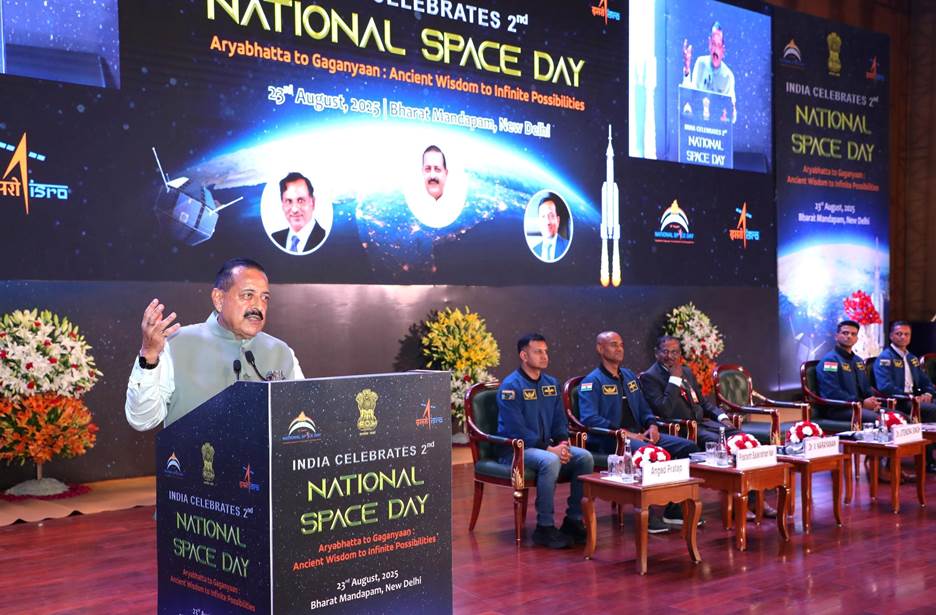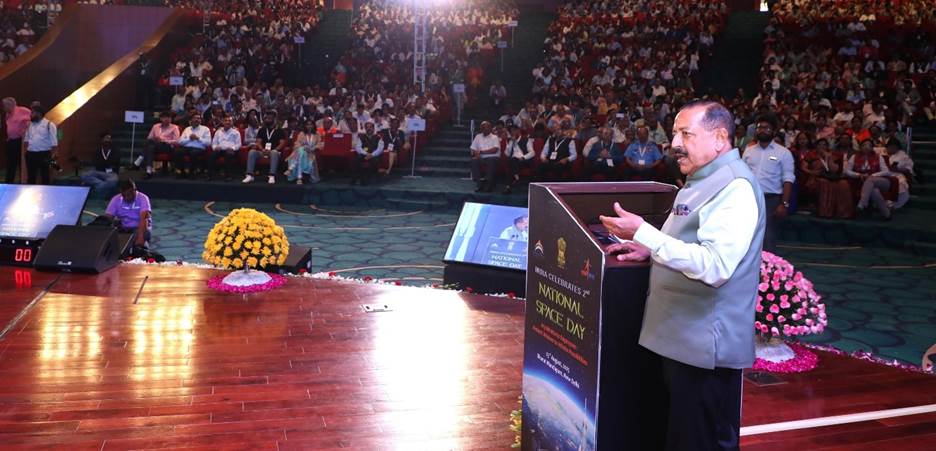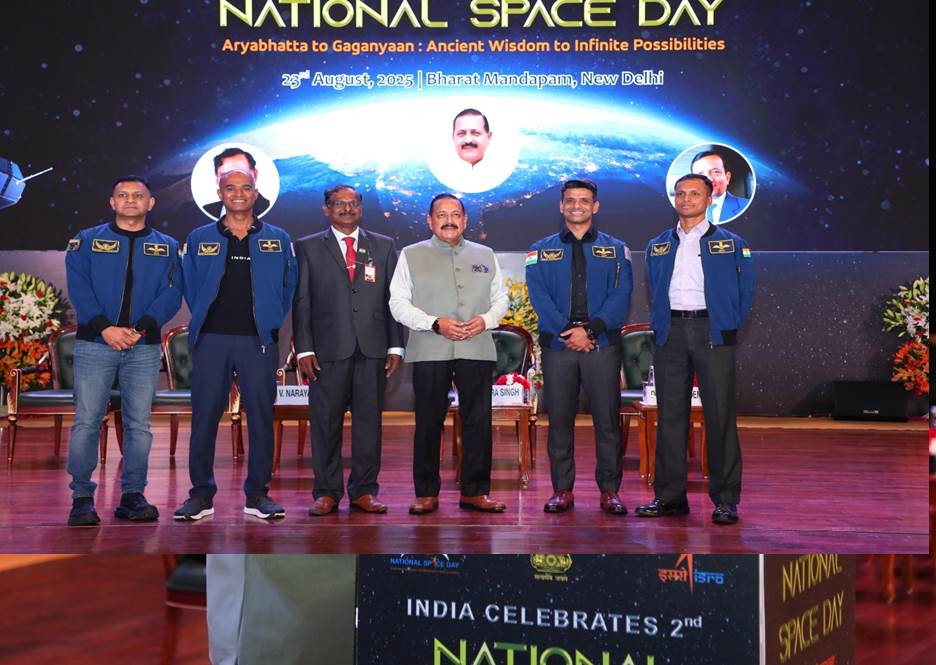Department of Space
An Indian will announce 'Viksit Bharat 2047' from the surface of Moon in 2040, and this will send a message around the universe that India has arrived: Dr Jitendra Singh
India Charts 15-Year Space Roadmap with 100+ Satellites, Greater Private Sector Role: Jitendra Singh
National Space Day Marks India’s Expanding Role in Global Space Endeavours, Says the Minister
National Space Day Celebrates Student Innovators: Bharatiya Antariksh Hackathon and ISRO Robotics Challenge Winners Honoured
Gaganyaan Astronauts Attend National Space Day; ISRO Outlines India’s Human Spaceflight Programme
Posted On:
23 AUG 2025 5:14PM by PIB Delhi
In a speech blended with science, poetry, realism and future promise, Union Minister for Science & Technology Dr. Jitendra Singh today said that an Indian will announce "Viksit Bharat 2047" from the surface of Moon in 2040, and this will send a message around the universe that India has arrived.
Addressing the National Space Day programme at Bharat Mandapam here, Dr Jitendra Singh said, India’s space programme has, from its very beginning, been about more than rockets and satellites - it has been about empowering people, improving lives, and shaping a better future. He also referred to the recently concluded National Meet 2.0, held a decade after the first Mega User Meet in 2015.
“National Space Day is a reminder that India’s achievements in space are not an end in themselves but a stepping stone to a larger vision — where science, innovation, and public welfare come together to build the nation’s future,” Dr. Jitendra Singh said. The ISRO has created a valuable asset for India, he said, pointing to four astronauts Group Captain Subhanshu Shukla, Group Captain Prasanth Balakrishnan Nair, Group Captain Ajit Krishnan and Group Captain Angad Pratap who are prepring for Gaganyaan mission.
Recalling Prime Minister Narendra Modi’s call in 2014 to expand the use of space technology in governance, Dr. Jitendra Singh noted that the 2015 had set the vision for integrating space applications into flagship development programmes. “Ten years later, both the government and private sector have grown significantly in their space capabilities,” he said. He added that the second edition of the National Meet was preceded by nearly 300 interactions with user departments and produced close to 90 documents, spanning over 5,000 pages, forming the foundation of a 15-year roadmap. The plan envisages the launch of over 100 satellites, 70 per cent of them small satellites, to be implemented through a mix of government technology missions and private sector-led operational missions.
According to Dr. Jitendra Singh, this roadmap will guide India’s space journey to 2040 and beyond, supporting the vision of Viksit Bharat by leveraging space technology for food and water security, disaster resilience, environmental sustainability, and inclusive growth.
Building on this vision, Dr. Jitendra Singh said that India’s space programme has entered a transformative phase where it is no longer confined to symbolic achievements but has become a vital contributor to the country’s scientific progress, technological innovation, and public welfare. At the event, he presented awards to students who won the Bharatiya Antariksh Hackathon-2025 and the ISRO Robotics Challenge – URSC 2025 (IRoC-U 2025).
Explaining the significance of National Space Day, Dr. Jitendra Singh said the occasion is a reminder of how far India has travelled since the early years of space research, and how the nation has grown into a trusted partner in international missions. “India is no longer a follower; today, other nations look to India to add value to their missions,” he said. He underlined that the observance is not only about celebrating past achievements but also about introspecting on what more can be done to unlock future opportunities in space science and technology.
Dr. Jitendra Singh said that the opening up of the space sector to private players has brought in a new wave of innovation and entrepreneurship. From once being limited to government-led projects, India today has hundreds of start-ups engaged in developing technologies with potential applications in interplanetary exploration as well as in day-to-day governance. He pointed out that space technology has silently entered people’s lives, powering projects such as disaster management, infrastructure monitoring, smart city planning, housing programmes, and even land ownership mapping through drones.
Presenting awards to student innovators, the Minister lauded the efforts of young minds in shaping India’s space future. The second edition of the Bharatiya Antariksh Hackathon drew participation from over 61,000 students across the country, with 8,744 teams competing on problem statements in geospatial technologies, space science, image processing, and AI/ML. The grand finale in early August saw the top 30 teams showcase their solutions in a 30-hour marathon session, from which the three best teams were chosen.
Similarly, the ISRO Robotics Challenge – URSC 2025 focused on the theme “Fly me on Mars”, tasking student teams to design autonomous aerial navigation systems capable of functioning in GPS-denied environments. Dr. Jitendra Singh said such initiatives not only provide hands-on exposure to the next generation but also feed into India’s long-term vision of developing indigenous capabilities for interplanetary exploration.
The Minister also outlined ISRO’s future programmes, noting that 2025 began with the successful launch of NavIC and will be followed later this year by the human-robot mission Vayumitra. In 2027, India will attempt its first human spaceflight under the Gaganyaan mission, followed by Chandramitra in 2028, Chandrayaan-4, a mission to Venus, and the establishment of the proposed Bharat Antariksh Station by 2035. He added that India has set its sights on placing an astronaut on the Moon by 2040, an endeavour that would symbolically mark the country’s journey towards becoming a developed nation by 2047.
Reflecting on India’s space heritage, Dr. Jitendra Singh said this year’s theme — “Aryabhatta to Gaganyaan: Ancient Wisdom to Infinite Possibilities” — captures the unique strength of combining traditional knowledge with modern innovation. He added that the experiments carried out by Indian astronauts and researchers, including in fields such as life sciences and biotechnology, are expected to yield benefits not just for India but for humanity as a whole.
“National Space Day is a reminder that India’s achievements in space are not an end in themselves but a stepping stone to a larger vision — where science, innovation, and public welfare come together to build the nation’s future,” Dr. Jitendra Singh said.
The celebrations were also attended by the four astronauts preparing for India’s Gaganyaan mission — IAF’s Group Captain Prasanth Balakrishnan Nair, Group Captain Ajit Krishnan, Group Captain Angad Pratap, and Wing Commander Shubhanshu Shukla — who have been undergoing extensive training for the mission.
Dr. V. Narayanan, Secretary, Department of Space and Chairman, ISRO, outlined India’s Human Space Flight Programme and briefed the gathering on upcoming ISRO missions, including key preparations for the Gaganyaan project. He emphasized that these initiatives represent a significant step in positioning India as a major player in future human space exploration.



*****
NKR/PSM
(Release ID: 2160151)
Visitor Counter : 850